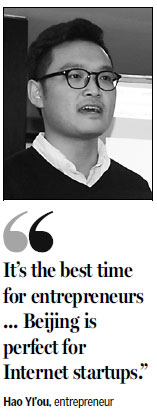Beijing's Zhongguancun area, considered the country's Silicon Valley, is offering geeks a lot more than hot brews. Deng Zhangyu reports.
Outside a coffee shop on Inno Way, a street in downtown Beijing, young people wait to take photos against the backdrop of a big screen that shows Premier Li Keqiang drinking coffee at the same shop with young entrepreneurs. The meeting took place on May 7, and ever since a nearby wall has been covered with banners calling upon people to start their businesses.
Along the nearly 200-meter-long street, there are several other coffee shops, where people gather to talk about investments, projects and big ideas. Dozens of lectures for startup companies are held there daily. It's not unusual to see people in the area entering bookstores to buy copies of Zero to One written by PayPal co-founder Peter Thiel and of related reads.
Inno Way is in Beijing's Zhongguancun area, which is sometimes called China's Silicon Valley. It has become the hub of entrepreneural activity with Li's consistent support and the rising prices of startups on stock exchanges.
Hao Yi'ou, 27, was making a speech about his startup at 3W Coffee when the premier visited on May 7.
"We feel spiritually supported," says Hao, who resigned in December from a financial institution that paid him more than 300,000 yuan ($48,400) a year, much higher than the city's average annual salary.
"The crazy increase of young entrepreneurs in the past two months is incredible. I really feel it," Hao says of a growing wave of startups, most offering mobile Web or online services. His Beijing-based company, Huchill, allows travelers to pay for their trips by installment. The travel service is now offered on WeChat.
The company's other co-founders - Dong Bo, an MIT graduate, and Chen Guo, a graduate of Peking University - are Hao's peers, who also resigned from well-paying jobs to launch the startup.
Their six-month-old company started providing services in March. The revenue in April alone reached 1 million yuan and its user base has already expanded to thousands of people.

"It's the best time for entrepreneurs. Young people are encouraged to have their own businesses. Beijing is perfect for Internet startups," Hao says.
According to data revealed by the management committee of Zhongguancun, the daily average of startups created in that area was 49 last year, three times that of in 2013.
Garage Coffee alone has seen about 15,000 startups looking for investors since 2011, says the cafe's CEO Jin Zisen.
The entrepreneurship boom has also swept other big cities like Shenzhen, Shanghai and Chengdu. Unlike Beijing's Internet-friendly environment, South China's Shen-zhen, once called the world's factory, is said to be good at cultivating startups focusing on intelligent hardware.
Shi Chi, 34, returned to China from Silicon Valley in the United States to build up a virtual reality-devices company called uSens. Before his return in 2013, Shi set up several companies in the US.
The entrepreneur with a doctorate in physics says his return follows China's startup wave.
"Lots of Chinese who used to work in the Silicon Valley chose to return to China to set up their businesses because China has the largest industry chain and consumer market," says Shi.
Shi set up a factory for his high-tech devices in Shen-zhen. The project won crowdfunding of more than $300,000 within two months of their presence on a leading crowdfunding website.
The other co-founders - Fei Yue and He Anli - previously enjoyed their respective jobs in Silicon Valley. But they, too, decided to give up their lives in the US and return to China.
"It's great that China has emphasized innovation recently although it's just the beginning," Shi says.
Many of China's local governments have sent envoys to the US to attract overseas Chinese entrepreneurs to return to China, says Shi.
He felt that the business environment for startups is becoming better because China has started highlighting innovation more.
"It's the best time for innovators and entrepreneurs," says Wang Shenglin, founder of Beijing Maker Space, a major group of China's young entrepreneurs.
In April, Beijing Maker Space put its promotion post on the digital screen in Times Square in New York.
Now it is expanding in other cities, and its Tianjin branch is already operating.
Wang says that, in the next five years, China's young innovators will have developed an era that will transform all traditional industries with the Internet and mobile Web.
Jingdong, one of China's major online retailers, also opened its tea shop on Inno Way the day after Li's visit, aiming to attract entrepreneurs to pitch their ideas.
Contact the writer at dengzhangyu@chinadaily.com.cn
|
3W Coffee in Beijing's Zhongguancun area is increasingly popular among young entrepreneurs, particularly after Premier Li Keqiang's visit in early May.Photos Provided To China Daily |